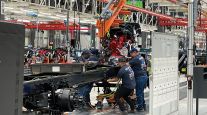Navistar Spokesman Roy Wiley Retires
This story appears in the July 4 print edition of Transport Topics.
Navistar International Corp. spokesman Roy Wiley has concluded a 13-year run with the Warrenville, Ill., truck and engine maker and an overall career of 59 years in newspaper journalism and public relations, retiring June 30.
Wiley, 76, started as a copy boy with the Chicago Sun-Times in 1952. He covered several local beats before becoming automotive and later assistant financial editor — and also managed to squeeze in cards and drinks on a regular basis with legendary columnist Mike Royko.
“I interviewed Henry Ford II, George Romney of American Motors and the CEOs of General Motors and Chrysler. Those were fun days, and I got the scoop from GM when they introduced the Riviera,” said Wiley in a recent telephone interview.
Navistar said June 29 that it has hired Jim Spangler from Tenneco Inc. as chief communications officer, to replace Wiley.
After covering Navistar’s predecessor company, International Harvester, as a reporter, Wiley returned to the original equipment manufacturer in 1998 as an account executive with public relations firm Hill & Knowlton. The following year, John Horne, then Navistar’s chairman and CEO, tired of paying fees to the PR firm and hired Wiley as an employee.
Wiley said he was fortunate in dealing with Horne and his successor, Daniel Ustian, because they were active in dealing with the news media, but Ustian said Wiley had to drag him into it.
“Roy wanted me to go on ‘Squawk Box,’ but I didn’t want to do that. I said it didn’t matter,” Ustian recalled, referring to the television business program.
“But Roy said, ‘No, you’re a spokesman for the industry.’ So we go to CNBC at 4 in the morning. Roy and I are wearing business suits, and this guy comes in wearing boxer shorts or pajama bottoms — and it’s Mark Haines, the host. Roy defended him and told me that’s fine because he’s sitting behind a desk and you can only see the top half of him,” Ustian said.
Haines died in May.
Ustian credited Wiley with helping him through recent major events such as the diesel truck engine emissions faceoff against other truck makers, Navistar’s accounting restatements with the Securities and Exchange Commission and relocation of the company’s engineering facilities to Illinois.
“I tended to be more aggressive in those cases, but Roy took out the emotion. He said, ‘Stay with the facts and take the high road. Don’t get dragged in emotionally,’ ” Ustian said, adding that Wiley coached him on how to answer questions from the press.
“Roy said, ‘They’ll ask you five different things, but you need to figure out what you want to say and get out there and how to squeeze it in.’ ” Ustian said.
Wiley — whose voicemail message advised reporters and others to “have a quality day until we speak in real time” — said his mother worked in a factory during World War II and his father published a monthly newspaper for veterans, turning to politics unsuccessfully when he ran for Congress during the Great Depression as a conservative Republican.
His father’s newspaper connections helped Roy get his start at the Sun-Times. For most of Wiley’s tenure at the paper, Chicago had three major dailies, and he competed against the Tribune and the Daily News.
After leaving newspapers for PR in 1968, he sometimes worked in politics. Wiley worked for two successful candidates — the younger Richard Daley, former mayor of Chicago, and Rahm Emanuel when he ran for the U.S. House of Representatives. He was also the press secretary for 1976 Illinois Democratic gubernatorial candidate Michael Howlett, who lost 101 of 102 counties.
“The polls were so bad we were supposed to lose every county, but after I arrived we only lost 101,” Wiley quipped.




